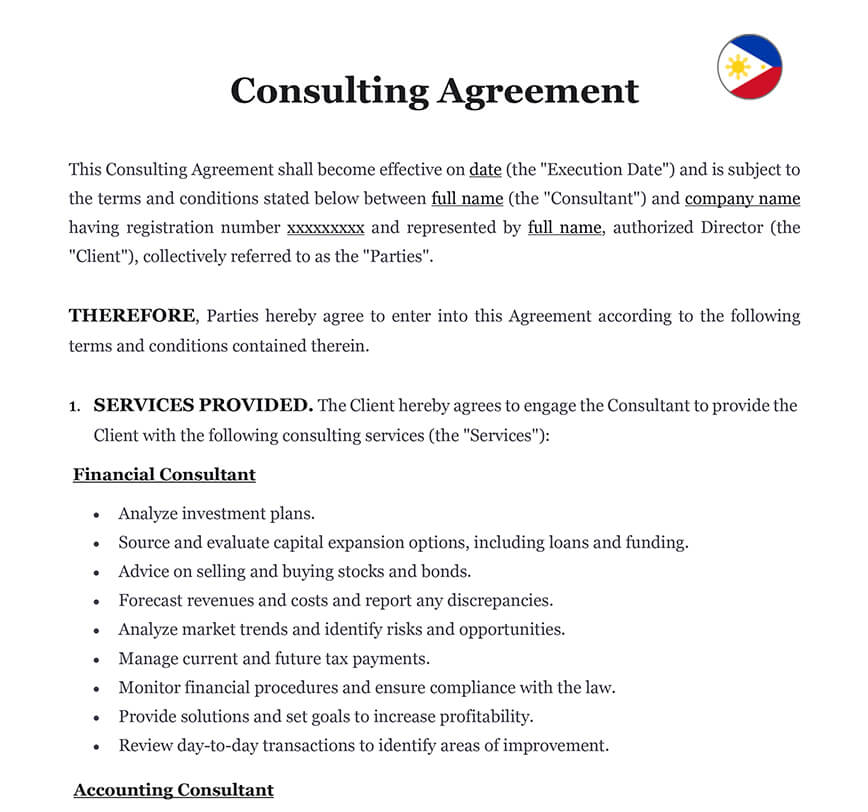Ready to use legal template
Drafted by experienced lawyers
Compliant with Filipino law
Ready to use legal template
Drafted by lawyers
Compliant with Filipino law
Home › Business contracts › Consulting agreement
Learn more about Consulting Agreement in Philippines
Consultants provide assistance to firms seeking to grow their operations. The consulting market includes strategy consulting, information system consulting, marketing, human resources consulting, and finance consulting. A consultant’s goal is to perform an in-depth analysis of a client’s problem or project. The consultant then gives advice to help the customer solve his problem or effectively finish his job. This mission component is typically crucial for the customer, and the Consultant assumes responsibility for it. As a result, creating a Consulting Agreement that fully specifies the components’ commitments is crucial. Use a Consulting Agreement to give services or advice in a certain field such as marketing, human resources, engineering, and so on to a customer in exchange for compensation.
Table of contents
What is a Consulting Agreement?
A Consulting Agreement is a contract between a consultant and a customer who seeks to retain certain defined services of the consultant for a set period of time at a set rate of remuneration. As previously said, the conditions of the agreement might be either basic or extremely complicated.
What is included in the Consulting Agreement?
A Consultancy Agreement for services is required anytime a company or corporation hires consultants or undertakes any project.
Firms or corporations may take up work in an area or subject with which they are unfamiliar.
In such circumstances, rather of hiring a large number of specialists in the industry, businesses choose to hire a consulting firm. Such consultants have specialized knowledge in a certain field and may assist the organisation with short-term assignments. This not only helps the organisation save money in the long run, but it also allows them to work on more diverse projects.
In such instances, they may engage into a Consultant Agreement to guarantee that both parties’ best interests are fulfilled. As it binds both parties through a formal contract, such a consultant agreement for services ensures that there is no misinterpretation or dishonesty on either side.
1. The scope of the project
A Consulting Contract should include a clear explanation of the responsibilities you will do as well as the deliverables you will provide to the customer. The agreement may also specify how much work you will do at the client’s location and how frequently you will work remotely. Make it explicit in the agreement if you feel you will require unique equipment or other resources to complete your work.
Projects evolve, and a client may decide to change the scope of your tasks at any time, including adding new responsibilities. In such circumstances, it’s a good idea to revise and resign the contract so you don’t wind up performing more work for free and the customer has a written record.
2. Rates of pay and invoicing
A Consulting Agreement should include your hourly rate or the fee you will charge to accomplish a job. Regardless of the cost structure, specify how frequently you want to bill the customer – monthly, quarterly, or upon completion of a work. If you anticipate that the consulting assignment will include travel, hotel stays, or other incidentals, the contract may provide that the client will compensate you for these costs.
3. Timelines and deadlines
Include a timeframe for the completion of your job if you are counseling a customer on a specific project. If a customer keeps your consulting services on an ongoing basis, specify your weekly, monthly, or quarterly billable hours.
Establish timeframes for deliverables with the customer to ensure that expectations are clear. You might also state that you are not liable for any missed deadlines if the customer fails to give you with the resources you require to execute the task properly or fails to reply to queries in a timely way.
4. Clauses of termination
If a project or customer relationship does not go as planned, it is best to have an exit strategy in place. For example, your Consulting Agreement with your company may say that you would halt work if you are not paid on time. If a client is unhappy with your services, you might require them to give you two weeks’ notice before canceling your contract. Alternatively, you might specify that any person has the right to end the relationship at any moment for any reason.
5. Resolution of Disputes
Although it is unusual that you or a client would need to take legal action against the other party, it is preferable to be prepared. For example, if a client cancels your contract for whatever reason, you may hold them responsible for payment on work previously completed. If the client fails to repay you within a certain time frame and you are forced to launch a lawsuit, you may be able to demand that they pay your legal expenses and court costs.
Why hire a consultant for your business?
Many projects need the application of specialized knowledge. In such cases, it is recommended that you contact a specialist for assistance with their expert services. This is appropriate when the necessity is temporary and the company does not want to appoint a permanent employee to the job. Under summary, engaging a consultant is better in the following circumstances:
| ➤ When demand is merely temporary. When the demand is event-based or for a set time period, it is advisable to hire a consultant for the duration of the event or until it occurs. |
| ➤ Expert Opinion: Because the consultant works in their specialized field, they have extensive knowledge gained via extensive research. They have specialized knowledge and hence provide professional counsel and perfect results for the issues or tasks assigned to them. |
| ➤ A critical and unbiased evaluation of the business is required: Consultants are the best solution whenever a critical and unbiased investigation of the business is required. They provide unbiased evaluations and analysis since they have no personal or business ties to the corporation. Such honest input might be beneficial to the firm. |
| ➤ Allows for adaptability: The consultants do not work full-time for the organization. They can be appointed for a certain period of time, with their reappointment determined by an appraisal of their performance. This allows the organization to choose the expert most suited to their needs. |
| ➤ It is also less expensive to hire a consultant than to hire a full-time employee. Because no employee perks are required. |




